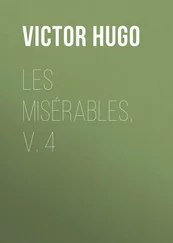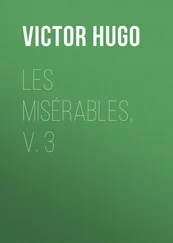Lascelles Wraxall - Les Misérables, v. 2
Здесь есть возможность читать онлайн «Lascelles Wraxall - Les Misérables, v. 2» — ознакомительный отрывок электронной книги совершенно бесплатно, а после прочтения отрывка купить полную версию. В некоторых случаях можно слушать аудио, скачать через торрент в формате fb2 и присутствует краткое содержание. Жанр: literature_19, foreign_antique, foreign_prose, на английском языке. Описание произведения, (предисловие) а так же отзывы посетителей доступны на портале библиотеки ЛибКат.
- Название:Les Misérables, v. 2
- Автор:
- Жанр:
- Год:неизвестен
- ISBN:нет данных
- Рейтинг книги:5 / 5. Голосов: 1
-
Избранное:Добавить в избранное
- Отзывы:
-
Ваша оценка:
- 100
- 1
- 2
- 3
- 4
- 5
Les Misérables, v. 2: краткое содержание, описание и аннотация
Предлагаем к чтению аннотацию, описание, краткое содержание или предисловие (зависит от того, что написал сам автор книги «Les Misérables, v. 2»). Если вы не нашли необходимую информацию о книге — напишите в комментариях, мы постараемся отыскать её.
Les Misérables, v. 2 — читать онлайн ознакомительный отрывок
Ниже представлен текст книги, разбитый по страницам. Система сохранения места последней прочитанной страницы, позволяет с удобством читать онлайн бесплатно книгу «Les Misérables, v. 2», без необходимости каждый раз заново искать на чём Вы остановились. Поставьте закладку, и сможете в любой момент перейти на страницу, на которой закончили чтение.
Интервал:
Закладка:
At nine o'clock, the moment when the French army, échelonned and moving in five columns, began to deploy, the divisions in two lines, the artillery between, the bands in front, drums rattling and bugles braying, – a powerful, mighty, joyous army, a sea of bayonets and helmets on the horizon, the Emperor, much affected, twice exclaimed, – "Magnificent! magnificent!"
Between nine and half-past ten, although it seems incredible, the whole army took up position, and was drawn up in six lines, forming, to repeat the Emperor's expression, "the figure of six V's." A few minutes after the formation of the line, and in the midst of that profound silence which precedes the storm of a battle, the Emperor, seeing three 12-pounder batteries defile, which had been detached by his orders from Erlon, Reille, and Lobau's brigades, and which were intended to begin the action at the spot where the Nivelles and Genappe roads crossed, tapped Haxo on the shoulder, and said, "There are twenty-four pretty girls, General." Sure of the result, he encouraged with a smile the company of sappers of the first corps as it passed him, which he had selected to barricade itself in Mont St. Jean, so soon as the village was carried. All this security was only crossed by one word of human pity: on seeing at his left, at the spot where there is now a large tomb, the admirable Scotch Grays massed with their superb horses, he said, "It is a pity." Then he mounted his horse, rode toward Rossomme, and selected as his observatory a narrow strip of grass on the right of the road running from Genappe to Brussels, and this was his second station. The third station, the one he took at seven in the evening, is formidable, – it is a rather lofty mound which still exists, and behind which the guard was massed in a hollow. Around this mound the balls ricochetted on the pavement of the road and reached Napoleon. As at Brienne, he had round his head the whistle of bullets and canister. Almost at the spot where his horse's hoofs stood, cannon-balls, old sabre-blades, and shapeless rust-eaten projectiles, have been picked up; a few years ago a live shell was dug up, the fusee of which had broken off. It was at this station that the Emperor said to his guide, Lacoste, a hostile timid peasant, who was fastened to a hussar's saddle, and tried at each volley of canister to hide himself behind Napoleon, "You ass! it is shameful; you will be killed in the back." The person who is writing these lines himself found, while digging up the sand in the friable slope of this mound, the remains of a shell rotted by the oxide of forty-six years, and pieces of iron which broke like sticks of barley-sugar between his fingers.
Everybody is aware that the undulations of the plains on which the encounter between Napoleon and Wellington took place, are no longer as they were on June 18, 1815. On taking from this mournful plain the material to make a monument, it was deprived of its real relics, and history, disconcerted, no longer recognizes itself; in order to glorify, they disfigured. Wellington, on seeing Waterloo two years after, exclaimed, "My battle-field has been altered." Where the huge pyramid of earth surmounted by a lion how stands, there was a crest which on the side of the Nivelles road had a practicable ascent, but which on the side of the Genappe road was almost an escarpment. The elevation of this escarpment may still be imagined by the height of the two great tombs which skirt the road from Genappe to Brussels: the English tomb on the left, the German tomb on the right. There is no French tomb, – for France the whole plain is a sepulchre. Through the thousands of cart-loads of earth employed in erecting the mound, which is one hundred and fifty feet high and half a mile in circumference, the plateau of Mont St. Jean is now accessible by a gentle incline; but on the day of the battle, and especially on the side of La Haye Sainte, it was steep and abrupt. The incline was so sharp that the English gunners could not see beneath them the farm situated in the bottom of the valley, which was the centre of the fight. On June 18, 1815, the rain had rendered the steep road more difficult, and the troops not only had to climb up but slipped in the mud. Along the centre of the crest of the plateau ran a species of ditch, which it was impossible for a distant observer to guess. We will state what this ditch was. Braine l'Alleud is a Belgian village and Ohain is another; these villages, both concealed in hollows, are connected by a road about a league and a half in length, which traverses an undulating plain, and frequently buries itself between hills, so as to become at certain spots a ravine. In 1815, as to-day, this road crossed the crest of the plateau of Mont St. Jean: but at the present day it is level with the ground, while at that time it was a hollow way. The two slopes have been carried away to form the monumental mound. This road was, and still is, a trench for the greater part of the distance, – a hollow trench, in some places twelve feet deep, whose scarped sides were washed down here and there by the winter rains. Accidents occurred there: the road was so narrow where it entered Braine l'Alleud, that a wayfarer was crushed there by a wagon, as is proved by a stone cross standing near the grave-yard, which gives the name of the dead man as "Monsieur Bernard Debrye, trader, of Brussels," and the date, "February, 1637." It was so deep on the plateau of Mont St. Jean, that a peasant, one Mathieu Nicaise, was crushed there in 1783 by a fall of earth, as is proved by another stone cross, the top of which disappeared in the excavations, but whose overthrown pedestal is still visible on the grass slope to the left of the road between La Haye Sainte and the farm of Mont St. Jean. On the day of the battle, this hollow way, whose existence nothing revealed, a trench on the top of the escarpment, a rut hidden in the earth, was invisible, that is to say, terrible.
CHAPTER VIII
THE EMPEROR ASKS THE GUIDE A QUESTION
On the morning of Waterloo, then, Napoleon was cheerful, and had reason to be so, – for the plan he had drawn up was admirable. Once the battle had begun, its various incidents, – the resistance of Hougomont; the tenacity of La Haye Sainte; Bauduin killed, and Foy placed hors de combat ; the unexpected wall against which Soye's brigade was broken; the fatal rashness of Guilleminot, who had no petards or powder-bags to destroy the farm gates; the sticking of the artillery in the mud; the fifteen guns without escort captured by Uxbridge in a hollow way; the slight effect of the shells falling in the English lines, which buried themselves in the moistened ground, and only produced a volcano of mud, so that the troops were merely plastered with mud; the inutility of Piret's demonstration on Braine l'Alleud, and the whole of his cavalry, fifteen squadrons, almost annihilated; the English right but slightly disquieted and the left poorly attacked; Ney's strange mistake in massing instead of échelonning the four divisions of the first corps; a depth of twenty-seven ranks and a line of two hundred men given up in this way to the canister; the frightful gaps made by the cannon-balls in these masses; the attacking columns disunited; the oblique battery suddenly unmasked on their flank; Bourgeois, Donzelot, and Durutte in danger; Quiot repulsed; Lieutenant Viot, that Hercules who came from the Polytechnic school, wounded at the moment when he was beating in with an axe the gates of La Haye Sainte, under the plunging fire of the English barricade on the Genappe road; Marcognet's division caught between infantry and cavalry, shot down from the wheat by Best and Pack, and sabred by Ponsonby; its battery of seven guns spiked; the Prince of Saxe Weimar holding and keeping in defiance of Count d'Erlon, Frischemont and Smohain; the flags of the 105th and 45th regiments which he had captured; the Prussian black Hussar stopped by the scouts of the flying column of three hundred chasseurs, who were beating the country between Wavre and Plancenoit; the alarming things which this man said; Grouchy's delay; the fifteen hundred men killed in less than an hour in the orchard of Hougomont; the eighteen hundred laid low even in a shorter space of time round La Haye Sainte, – all these stormy incidents, passing like battle-clouds before Napoleon, had scarce disturbed his glance or cast a gloom over this imperial face. Napoleon was accustomed to look steadily at war; he never reckoned up the poignant details; he cared little for figures, provided that they gave the total – victory. If the commencement went wrong, he did not alarm himself, as he believed himself master and owner of the end; he knew how to wait, and treated Destiny as an equal. He seemed to say to fate, "You would not dare!"
Читать дальшеИнтервал:
Закладка:
Похожие книги на «Les Misérables, v. 2»
Представляем Вашему вниманию похожие книги на «Les Misérables, v. 2» списком для выбора. Мы отобрали схожую по названию и смыслу литературу в надежде предоставить читателям больше вариантов отыскать новые, интересные, ещё непрочитанные произведения.
Обсуждение, отзывы о книге «Les Misérables, v. 2» и просто собственные мнения читателей. Оставьте ваши комментарии, напишите, что Вы думаете о произведении, его смысле или главных героях. Укажите что конкретно понравилось, а что нет, и почему Вы так считаете.












